The Future of Healing: How AI is Transforming Healthcare
In a world where innovation moves faster than ever, one technology is fundamentally reshaping healthcare as we know it: Artificial Intelligence (AI). Once a futuristic concept reserved for sci-fi movies, AI is now deeply embedded in how we diagnose, treat, and manage health conditions — making care faster, smarter, and more personalized than ever before.
Today, AI isn’t just a “nice to have” in the healthcare industry; it’s becoming essential. From predicting disease outbreaks to assisting in life-saving surgeries, the possibilities are expanding daily.
Let’s explore how AI is changing healthcare for the better, the key technologies behind it, the benefits for patients and providers, and what the future holds.
 What is AI in Healthcare?
What is AI in Healthcare?
AI in healthcare refers to the use of machine learning algorithms, deep learning models, natural language processing (NLP), and other cognitive technologies to simulate human intelligence. These tools analyze complex medical data quickly and accurately, providing insights that were once impossible or incredibly time-consuming to achieve.
Rather than replacing doctors, AI empowers healthcare professionals to make better decisions, optimize workflows, and deliver highly personalized care.
Key areas where AI is making an impact include:
-
Medical imaging and diagnostics
-
Drug discovery and development
-
Predictive analytics
-
Robotic-assisted surgeries
-
Virtual health assistants
-
Personalized treatment plans
-
Remote patient monitoring
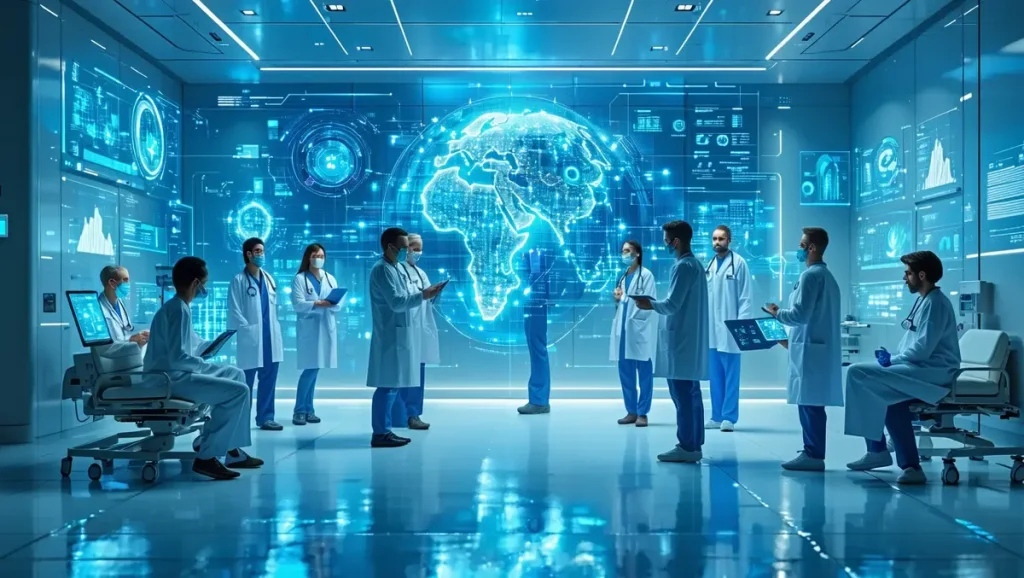
How AI is Transforming Healthcare
1. Faster, More Accurate Diagnoses
Traditionally, diagnosing complex diseases like cancer or neurological disorders could take weeks of testing and review. AI systems, however, can analyze medical images (like X-rays, MRIs, and CT scans) with incredible precision — sometimes detecting abnormalities even before human eyes can.
For instance, deep learning models can identify signs of breast cancer or lung disease from scans with accuracy rates rivaling top radiologists. This not only speeds up diagnosis but also ensures early intervention, drastically improving patient outcomes.
2. Personalized Treatment Plans
Every patient is unique — and now, their treatments can be too.
AI systems analyze a patient’s genetic information, lifestyle, medical history, and even social factors to create highly customized treatment plans. Instead of “one-size-fits-all” medicine, doctors can now offer therapies that are tailored to a person’s individual biology, improving effectiveness and minimizing side effects.
Precision medicine, driven by AI, is particularly transformative in oncology, cardiology, and rare disease management.
3. Revolutionizing Drug Discovery
Bringing a new drug to market traditionally costs billions of dollars and takes over a decade. AI is streamlining this process dramatically.
Using machine learning models, researchers can simulate how different chemical compounds will behave, predict toxicity levels, and even identify new uses for existing drugs. This means faster development of life-saving medicines — at a fraction of the cost.
During the COVID-19 pandemic, AI played a critical role in accelerating vaccine and therapeutic discoveries.
4. Enhancing Robotic-Assisted Surgery
AI-powered robotic systems are transforming surgery, offering greater precision, flexibility, and control than ever before.
With the assistance of AI, surgeons can perform minimally invasive procedures that reduce patient recovery time, minimize infection risks, and improve surgical outcomes. Robots like the da Vinci Surgical System are already being used worldwide, demonstrating how AI can enhance, not replace, human expertise.
5. Predictive Analytics for Preventive Care
What if your doctor could predict a heart attack before it happens?
AI makes this possible. By analyzing data from wearable devices, electronic health records, and even social determinants of health, AI algorithms can predict potential health risks and alert both patients and providers early on.
This shift towards preventive care not only saves lives but also reduces healthcare costs by avoiding hospitalizations and complicated treatments.
6. Virtual Health Assistants and Chatbots
With healthcare systems often overwhelmed, AI-powered virtual assistants are stepping in to help. These intelligent bots can:
-
Answer patient questions
-
Schedule appointments
-
Provide medication reminders
-
Offer preliminary assessments
Virtual assistants free up human staff for more complex tasks and make healthcare more accessible to patients, especially in rural or underserved areas.
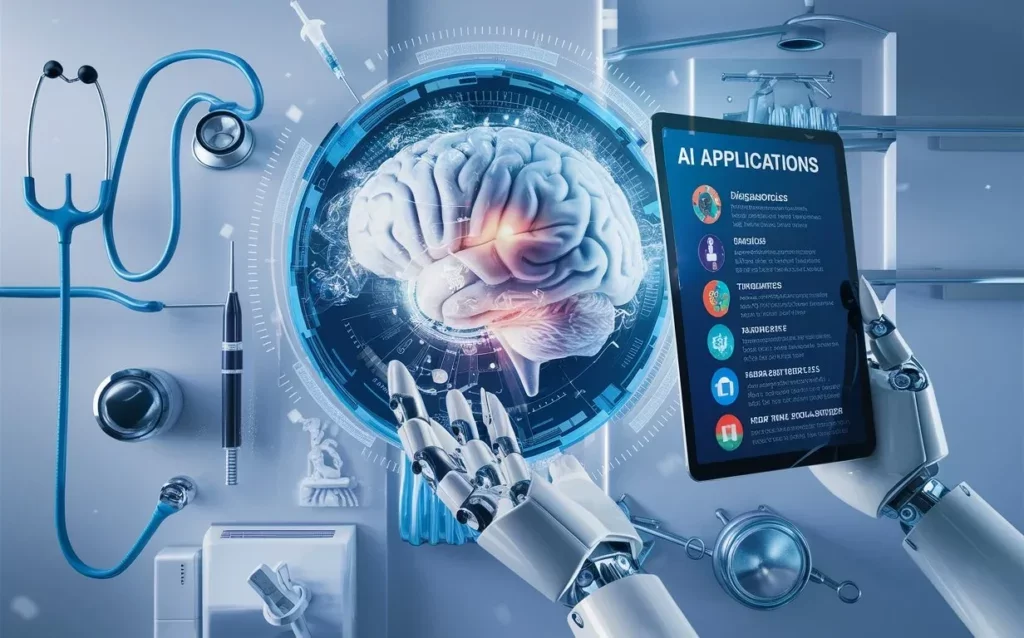
The Benefits of AI in Healthcare
The adoption of AI technologies brings numerous benefits to the healthcare ecosystem:
For Patients:
-
Faster and more accurate diagnoses
-
Personalized and effective treatments
-
Early detection and prevention of diseases
-
Improved access to care, even remotely
-
Better overall healthcare experiences
For Healthcare Providers:
-
Streamlined workflows and reduced administrative burden
-
Improved diagnostic accuracy
-
Data-driven insights for better clinical decisions
-
Cost savings and operational efficiencies
-
Ability to serve more patients effectively
For Researchers and Pharma Companies:
-
Accelerated drug discovery and clinical trials
-
Deeper understanding of disease mechanisms
-
New opportunities for precision medicine and biotech innovation
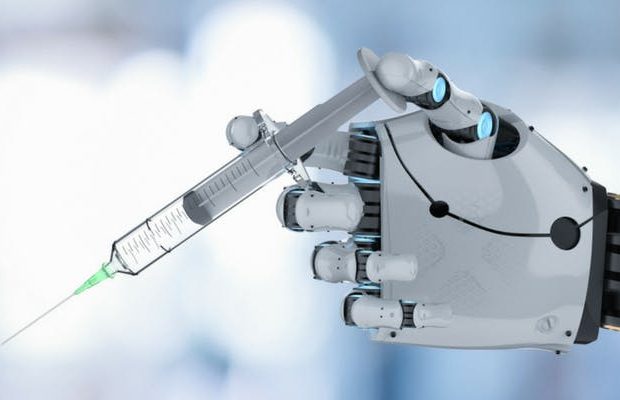
Challenges and Ethical Considerations
While AI in healthcare offers exciting possibilities, it’s not without challenges.
1. Data Privacy and Security
Healthcare data is highly sensitive. Ensuring patient privacy and securing AI systems against cyber threats is crucial.
2. Bias in AI Models
AI systems can unintentionally inherit biases from the data they are trained on, leading to disparities in diagnosis or treatment recommendations. Developers must actively work to eliminate bias to ensure fairness and equity.
3. Regulatory and Legal Frameworks
Regulatory bodies are still catching up with the fast pace of AI innovation. Ensuring proper oversight, validation, and ethical use is necessary to protect patients.
4. Human-AI Collaboration
While AI enhances healthcare, it cannot replace the empathy, intuition, and ethical judgment of human clinicians. Successful healthcare will always depend on collaboration between humans and machines.
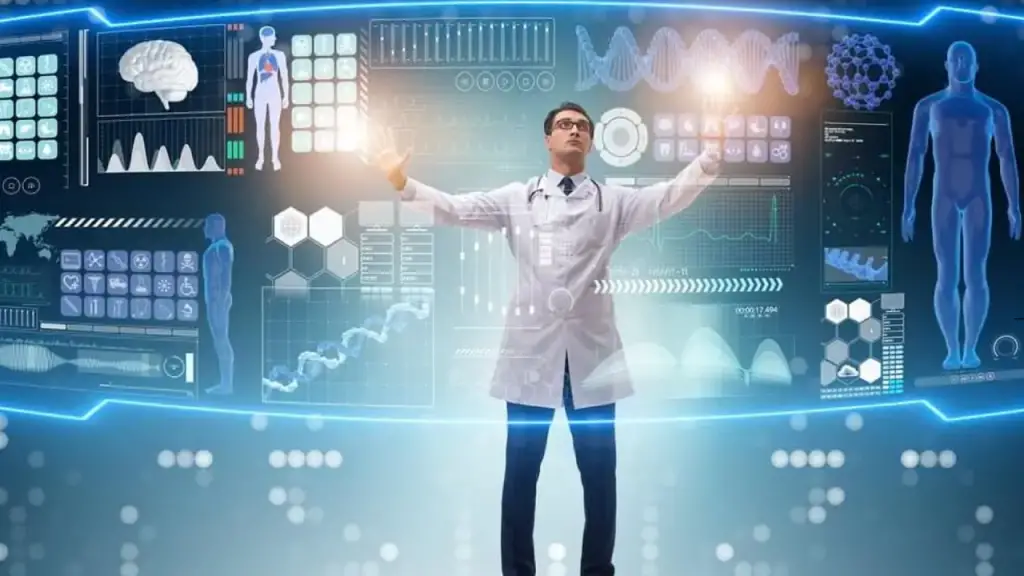
The Future of AI in Healthcare
The future is incredibly promising.
In the coming years, we can expect even greater integration of AI into healthcare, including:
-
AI-Generated Clinical Trial Designs to optimize research.
-
Real-Time Remote Monitoring using smart devices and IoT.
-
AI-Enhanced Mental Health Support through personalized therapy bots.
-
Autonomous AI Systems that can make and act on clinical decisions under supervision.
-
Global Health Solutions using AI to monitor and manage pandemics, disease outbreaks, and public health issues.
As technology evolves, AI will continue to democratize healthcare, making high-quality care accessible to more people around the world.
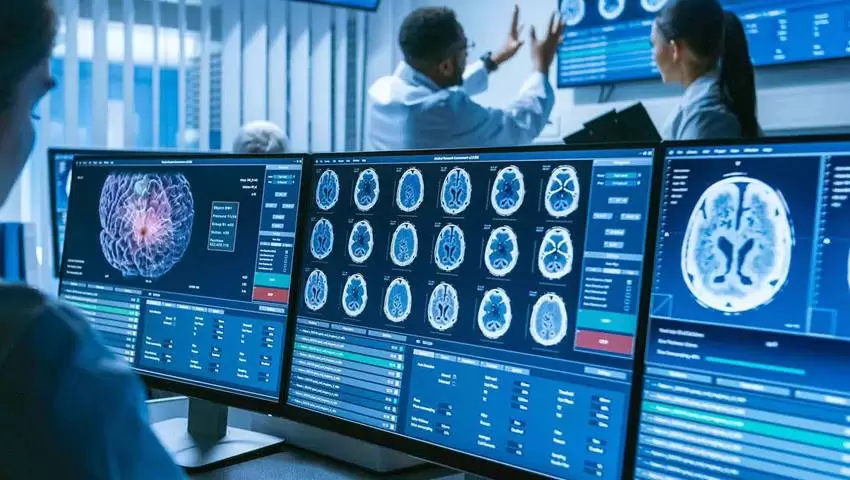
Conclusion
AI in healthcare is not about replacing doctors or nurses; it’s about giving them superpowers.
By harnessing the speed, scale, and precision of AI, healthcare providers can offer better, faster, and more personalized care than ever before. Patients benefit from earlier diagnoses, targeted treatments, and greater empowerment over their health journeys.
Still, as we embrace this new era, it’s vital to prioritize ethics, equity, and human connection. Because at the heart of every AI breakthrough is a simple, universal goal: improving lives.
The future of healthcare is bright — and with AI, it’s already here.








